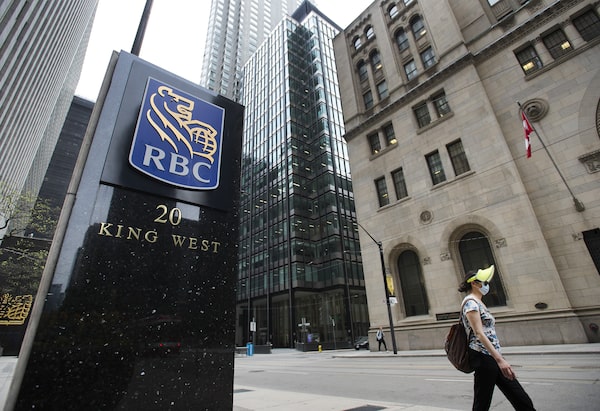
A person walks by the Royal Bank of Canada building in Toronto, on May 27, 2020.Nathan Denette/The Canadian Press
Profits at two major Canadian banks rebounded to prepandemic levels in the final quarter of a turbulent fiscal year, but their CEOs both warn that growth in revenues will be slower to pick up speed with cases of the novel coronavirus on the rise again.
Royal Bank of Canada and National Bank of Canada each reported earnings for the year ended Oct. 31 that were higher than analysts had anticipated. But the pandemic will keep cramping client demand for new loans, and lending margins will continue to be squeezed by low interest rates, so it will take time for banks to recover lost ground.
In large part, fourth-quarter earnings at RBC and National Bank improved because each lender set aside smaller amounts to cover potential loan losses than the billions of dollars in reserves they had stockpiled over the previous six months. On Tuesday, Bank of Nova Scotia and Bank of Montreal each handily beat analysts’ estimates for the same reason, and all four banks now believe they are well prepared to absorb a rise in loan defaults over the coming quarters, which is expected to be gradual rather than jarring.
But executives at RBC and National Bank adopted a cautious tone on Wednesday, emphasizing that the trajectory of the pandemic is still very unclear. Investors have also turned their attention to the persistent challenges banks face as they try to increase revenues in the midst of a fragile economic recovery.
RBC’s full-year profit fell 11 per cent to $11.44-billion – the first year-over-year decline for Canada’s largest bank since the global financial crisis in 2009 – while annual revenue rose a mere 2.6 per cent to $47.2-billion.
“The economy has rebounded well to date, but given the emergence of a second wave of COVID-19 in our core markets, we expect economic growth to slip over the next couple of quarters,” RBC chief executive Dave McKay said on a Wednesday conference call with analysts.
The promise of potent vaccines on the cusp of approval has fuelled optimism about the recovery. But with uncertainty about how quickly those drugs can be widely administered on a global scale, “we will need to continue to focus on bridging and mitigating the impact of the pandemic on our citizens,” Mr. McKay said.
The numbers of customers deferring payments on loans dropped sharply at both banks by the end of October. Deferred balances at RBC fell to $10.5-billion, from $62.8-billion as of July 31, while National Bank’s deferrals for retail and business clients declined 81 per cent and 74 per cent, respectively, to a total of $1.88-billion. About 2 per cent of loans have become delinquent after deferrals expired at each bank, but the vast majority of borrowers have resumed making payments.
As governments have reimposed lockdown measures, however, some clients “will experience further difficulties with the effects of a second wave,” Mr. McKay said. But he said he expects that because consumers and businesses are better prepared, the recent surge in virus cases should be less damaging to the economy than the first wave was this spring. “I think we’ve learned a lot,” he said. “We’re not going into the same sense of lockdown.”
In Quebec, recent restrictions have been “more targeted,” National Bank CEO Louis Vachon said in an interview. Construction and critical manufacturing have been allowed to carry on, and businesses such as restaurants and hotels have recaptured at least some sales with takeout services and by adhering to physical distancing measures. “The fact that some of them are generating some revenues, it’s lowering the negative impact,” he said. “They’re suffering, clearly, and the numbers are showing that. But it’s not as bad as the first lockdown.”
For the quarter that ended Oct. 31, RBC earned $3.25-billion, or $2.23 per share, compared with $3.21-billion, or $2.18 a share, in the same period a year earlier. After adjustments, RBC said it earned $2.27 per share, ahead of analysts’ consensus estimate of $2.05 per share, according to Refinitiv.
National Bank earned $492-million, or $1.36 per share, compared with $604-million, or $1.67 per share, a year earlier. Adjusted to exclude special items, including $48-million in severance pay, National Bank said it earned $1.69 per share. On average, analysts expected adjusted earnings per share of $1.52.
Profits from banks’ core retail operations dipped in the fourth quarter, down 7 per cent to $1.5-billion at RBC and nearly 3 per cent to $258-million at National Bank. It is likely to take “at least two quarters” before demand for new loans from small businesses starts bounces back, Mr. Vachon said, as companies are wary of taking on more debt. And although there has been a strong appetite for mortgages, customers are borrowing less for everyday spending on credit cards, driving down fees and interest.
“When you add all of those together, you get a slightly lower loan growth rate, which is appropriate given the economic circumstances,” Rod Bolger, RBC’s chief financial officer, said in an interview.
Capital levels rose significantly at both banks, partly because restrictions imposed by Canada’s banking regulator have temporarily halted dividend increases and share buybacks. RBC’s common equity Tier 1 ratio swelled to 12.5 per cent – which translates to a $19-billion buffer above regulatory minimums, Mr. McKay said. But he is not pushing for limits on payouts to shareholders to be relaxed just yet. “I think it’s a little premature. I think we want to see a more stable recovery. We want to see a more stable unemployment rate,” he said. “Caution still should rule the day.”
Your time is valuable. Have the Top Business Headlines newsletter conveniently delivered to your inbox in the morning or evening. Sign up today.
 James Bradshaw
James Bradshaw